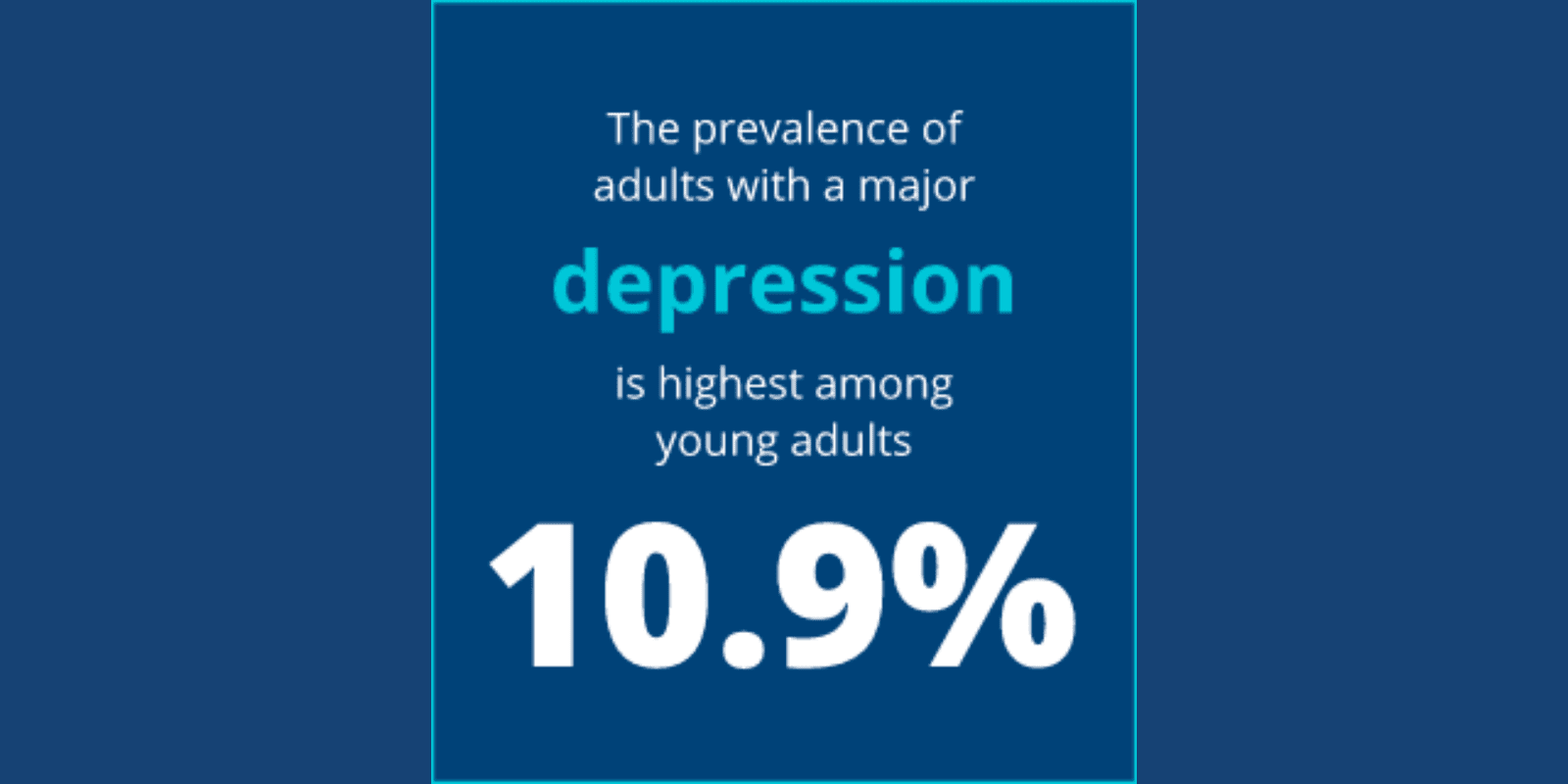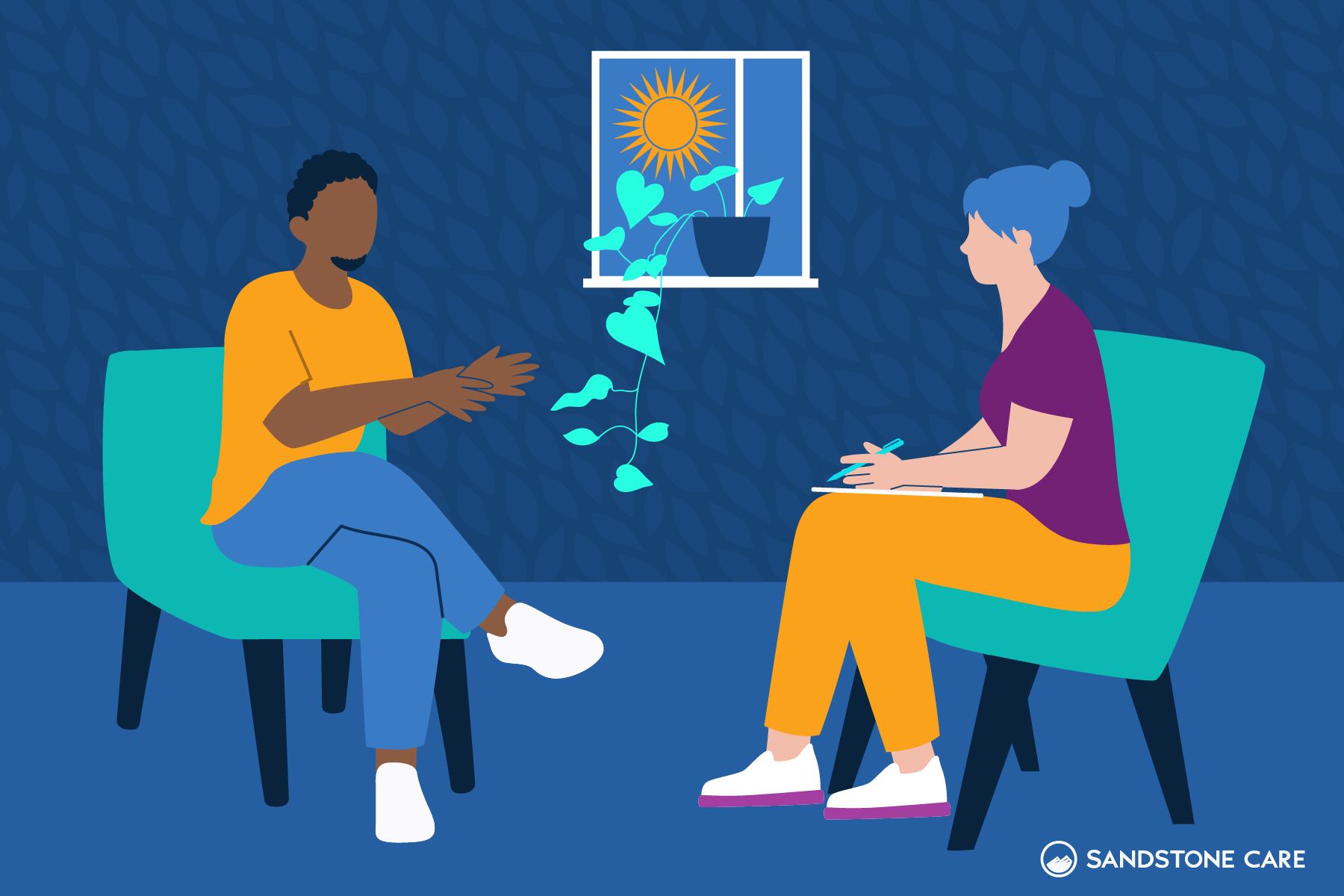Understanding Depression in Young Adults
If you’re a young adult, you’re at a tough stage of life. You may be juggling starting your career, managing your finances, navigating a romantic relationship or simply trying to make it on your own for the first time.
These things aren’t easy to do, and they don’t always work out right away. So if you feel down from time to time, that’s normal. Usually, those feelings of being down go away over time.
But if they persist for an inordinate amount of time, that may be a sign that it’s time to look into treatment.

What is Depression?
Risk Factors for Depression
Depression is one of the most common mental illnesses in the world. A recent survey by the National Institute of Mental Health shows that nearly 7 percent of American adults had an episode of depression in the previous year.
But depression is an even more serious problem for young adults than for other adults. The same survey found that the age range with the highest prevalence of depression was young adults – at nearly 11 percent. That’s one out of every 10 young adults.
So what causes depression? Researchers aren’t sure, but they have identified several factors that make certain people more likely to suffer from it.
- Genetics – If you have a parent or sibling who has suffered from depression, your risk of depression is higher.
- Chemical or hormonal imbalances – Imbalances in brain chemicals or hormones can cause you to become depressed.
- Seasons – Some people are more likely to become depressed in winter, when days are shortest and there’s less sunlight.
- Nutrition – When you don’t get enough of certain nutrients, you’re more likely to become depressed.
- Gender – Women are more likely to struggle with depression than men.
Symptoms of Depression
Everyone feels sad from time to time, but if any of the following symptoms remain persistent, you may be depressed:
- Anxiety
- Feelings of sadness or worthlessness
- Unwarranted irritation or anger
- Lethargy, fatigue, lack of energy
- Difficulties with concentration, memory or decision-making
- Challenges keeping things organized
- Inexplicable aches, pains, headaches or stomach problems
- Inability to sleep
- Sleeping much more than usual
- Lack of appetite
- Inordinately high appetite; weight gain
- Thoughts of self-harm or suicide
Depression and Relationships
People with depression can find it more challenging to find satisfaction in their relationships, as they may struggle with insecurities and lack the fully developed problem-solving skills necessary to work through relationship conflicts in constructive ways.
They may feel moody, irritable or feel like no one understands them, leading to even more withdrawal and isolation. If these issues aren’t sorted out earlier on, it’s also easy to carry them into adulthood.
People are social beings, and maintaining meaningful relationships with others is an essential facet of the human experience. Carrying out healthy romantic partnerships is an important skill to develop in young adulthood – which is why diagnosing and learning to manage depression in a relationship context is so beneficial for young people.
Depression in College
Heading off to college is an exciting time to be sure, but it’s not without its share of challenges: some students find themselves struggling emotionally as they learn to juggle their workload, balance a budget and get along with new roommates, all while being away from home for the first time.
While it’s totally normal for this new set of challenges to cause stress during a transitional phase, it can sometimes progress beyond the occasional university blues and develop into symptoms of depression.
If you struggle with depression, take this into account when planning your college experience. Visit the campus beforehand to familiarize yourself with it.
Identify available support systems like student groups and counseling resources, and proactively seek out ways to make friends and get involved in campus life to minimize your sense of isolation.
Self-Care Corner
While there will undoubtedly be good days and bad days, there are some simple things you can do to manage your depression symptoms and feel as good as you can feel from day to day. Though you may not always feel like it, try to do these as regularly as possible.
You’ll be surprised at what a difference a few small changes can make.
Set a regular sleep pattern.
One of the main symptoms of depression is that it causes you to sleep too little or too much, which has a huge impact on your mood. Try to establish a normal circadian rhythm: Keep a regular bedtime and do wind-down activities like reading, gentle stretching or journaling before bed.
Dim the lights and turn off electronics in your room to signal your brain that it’s time to sleep. Open your blinds and flood your room with natural light when you first wake up, which will make it much easier to get your day started on those days when it feels tough.
Stay away from drugs and alcohol.
Smoking, drinking and drug use are connected to depression. By avoiding or reducing alcohol, nicotine and other drugs, you’ll decrease the likelihood that depression will strike.
Find healthy outlets to ease your mind.
Talk to a parent, trusted friend or counselor about how you’re feeling; get outside, take some deep breaths and feel the sun shine on your skin; try practicing yoga and mindfulness meditation to form a healthier relationship with your thoughts.
Nourish your body.
When you’re depressed, it’s easy to let your diet slip or eat emotionally. But what you eat plays a huge role in how you feel, and mood foods like healthy fats can even improve your brain function.
If eating healthy is a challenge for you, try stocking your fridge with balanced, pre-prepped meals and nutritious snacks that are easy to reach for even if you’re low on energy.
Preventing Depression
Although depression can affect anyone, people who are worried that they could become a victim of depression have several things that they can do to make it less likely.
- Exercise regularly. Exercise releases endorphins that boost your mood, and research shows that high-intensity exercise can create positive brain change over time. Even if you don’t feel like it at the time, aim for 30 minutes of exercise a day – you’ll thank yourself for it later.
- Build social connections. Spend time with friends and family. Make new friends. Getting out of the house and connecting with people is a great way to help prevent depression.
- Minimize your stress level. Stress can lead to depression, so if possible, find ways to reduce some of the stress in your life. Learn to say no – cut out activities and responsibilities that are more trouble than they’re worth.
What to do if You’re Showing Signs of Depression
If you’re showing signs of depression, here are some steps you can take:
- Get support. Talk trusted friends and family members and let them know what you’re going through. You need support as you go through this struggle.
- Talk to your primary care physician. Because depression can have physical causes, your doctor may be able to help by checking for physical issues connected to your depression symptoms.
- In a crisis, get immediate help. If you’re considering harming yourself or taking your own life, get help immediately. Your life is worth living, and you need support to get through this. Call 911 or the National Suicide Prevention Lifeline at (800) 273-8255 immediately.
Get advice and support from the professionals at Sandstone Care.
Our team of compassionate counselors accepts you completely, just as you are. You’ll feel welcome and right at home in our warm, open environment.
Our staff will show you the care you need, and we’re at the ready seven days a week to answer questions and offer guidance as to how to best deal with your unique situation. Give us a call today at (888) 850-1890.









